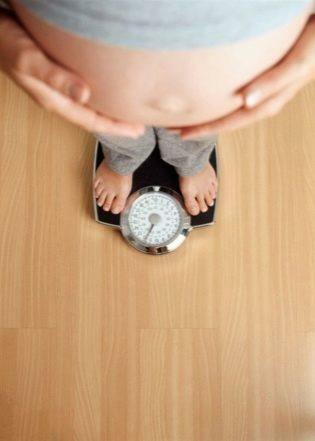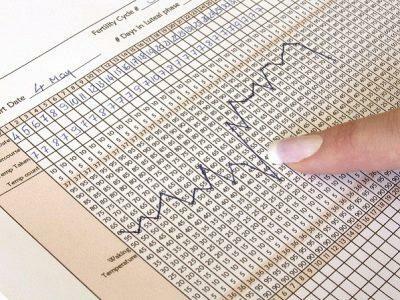Content
- Weight gain rate in different trimesters
- Average components in weight gain during pregnancy
- Pregnancy weight gain chart by week
- Why weight gain occurs during pregnancy
- What Causes Too Fast Weight Gain During Pregnancy
- Complications due to being overweight during pregnancy
- How to control weight
- Why is the lack of mass dangerous?
- Why fast weight gain is dangerous
- Should a pregnant woman eat "for two"
- Diet during pregnancy
Weight gain rate in different trimesters
It is believed that the allowable weight gain during pregnancy should be calculated individually. The value of the increase can be influenced by the initial weight and age, bad habits and even belonging to a particular race. Usually, the average is an increase of 9 to 11 kg. More accurate values of the recommended weight gain can only be given by a doctor, taking into account the characteristics of the body of a pregnant woman and body mass index (BMI) 1.

- The first trimester is characterized by slight weight gain. Some women may even lose weight, which is associated with toxicosis. Weight gain of 1-2 kilograms is considered the norm.
- The second trimester will no longer go unnoticed, the increase will be obvious. Toxicosis and constant fatigue cease to torment, certain food preferences appear. An addition of 1 kg monthly during this period is considered the norm.
- Already before the very birth, the expectant mother can see that she has become 11-16 kg more. These are the numbers that are considered normal. If a woman is expecting twins, the indicator can increase to 21 kg.
Alarming signals during pregnancy are a rapid jump in weight (a sharp increase) or a complete lack of weight gain. Weight loss in the second or third trimester carries risks to the health of the mother and fetus. During this period, the baby growing in the womb simply needs nutrients, and their lack can lead to pathologies and a lack of body weight.
Average components in weight gain during pregnancy
The increase in the weight of a pregnant woman is not only due to the body fat and the mass of the child. This is also influenced by an increase in the volume of circulating blood and intercellular fluid, the formation of amniotic fluid and placenta. These changes are essential for the proper growth and development of the baby.
| Child | 3500 BC |
| Uterus | 1000 BC |
| Placenta | 650 BC |
| Amniotic fluid | 900 BC |
| Fetal membranes and umbilical cord | 200-300 g. |
| Increased circulating blood volume | 1200 BC |
| Mammary gland | 500 BC |
| Adipose tissue | 2400 BC |
| Tissue fluid | 2700 BC |
| Total | about 13050 |
Pregnancy weight gain chart by week
There are averaged indicators as to what should be the weight gain of a pregnant woman by a particular week. These indicators are slightly different for single and multiple pregnancies, as well as depending on the body mass index (BMI) women before conceiving a child, but in all cases serve as a guide in assessing the course of pregnancy and predicting possible risks.
Dynamics of weight gain in singleton pregnancy, kg
| Week of pregnancy | BMI <18.5 | BMI 18.5-24.9 | BMI> 24.9 |
| 2 weeks | 0,5 | 0,5 | 0,5 |
| 4 weeks | 0,9 | 0,7 | 0,5 |
| 6 weeks | 1,4 | 1,0 | 0,6 |
| 8 weeks | 1,6 | 1,2 | 0,7 |
| 10 weeks | 1,8 | 1,3 | 0,8 |
| 12 weeks | 2,0 | 1,5 | 0,9 |
| 14 weeks | 2,7 | 1,9 | 1,0 |
| 16 weeks | 3,2 | 2,3 | 1,4 |
| 18 weeks | 4,5 | 3,6 | 2,3 |
| 20 weeks | 5,4 | 4,8 | 2,9 |
| 22 weeks | 6,8 | 5,7 | 3,4 |
| 24 weeks | 7,7 | 6,4 | 3,9 |
| 26 weeks | 8,6 | 7,7 | 5,0 |
| 28 weeks | 9,8 | 8,2 | 5,4 |
| 30 weeks | 10,2 | 9,1 | 5,9 |
| 32 weeks | 11,3 | 10,0 | 6,4 |
| 34 weeks | 12,5 | 10,9 | 7,3 |
| 36 weeks | 13,6 | 11,8 | 7,9 |
| 38 weeks | 14,5 | 12,7 | 8,6 |
| 40 weeks | 14,5 | 12,7 | 8,6 |
The table shows that, on average, for the entire period of pregnancy, a woman with a body mass index of less than 18.5 units is gaining 14.5 kg, a woman with a normal BMI is 12.7 kg, and expectant mothers, whose weight initially requires correction, - 8.6 kg.
Dynamics of weight gain in multiple pregnancies, kg
| Week of pregnancy | BMI <18.5 | BMI 18.5-24.9 | BMI> 24.9 |
| 2 | 0,9 | 0,9 | 0,9 |
| 4 | 3,3 | 1,8 | 1,0 |
| 6 | 5,1 | 2,7 | 1,2 |
| 8 | 6,0 | 3,6 | 1,3 |
| 10 | 7,7 | 5,0 | 1,5 |
| 12 | 8,2 | 5,4 | 1,7 |
| 14 | 9,5 | 6,4 | 2,1 |
| 16 | 10,9 | 7,3 | 2,5 |
| 18 | 12,2 | 8,2 | 3,0 |
| 20 | 13,6 | 9,0 | 3,1 |
| 22 | 15,0 | 10,4 | 3,8 |
| 24 | 17,2 | 11,3 | 4,6 |
| 26 | 19,0 | 12,2 | 5,5 |
| 28 | 20,9 | 13,6 | 6,0 |
| 30 | 21,8 | 14,5 | 6,4 |
| 32 | 22,5 | 15,0 | 6,9 |
| 34 | 23,6 | 16,3 | 8,2 |
| 36 | 24,5 | 17,2 | 9,1 |
| 38 | 25,4 | 18,1 | 10 |
| 40 | 25,4 | 18,1 | 10 |
A simple formula will help you calculate your body mass index: BMI = Weight: Height 2. So, the body mass index for a woman weighing 55 kg with a height of 1.66 m will be as follows: 55: (1.66 × 1.66) = 19.96. A pregnancy calculator and an ultrasound scan will help to verify the accuracy of the term.
Important! Slight deviations from the indicators indicated in the table above are permissible. The expectant mother should be alerted by weight gain at a rate of over 2 kg per week, or, conversely, too slow an increase.
Also, the basis for consultation with a specialist is:
- no weight gain for two consecutive weeks;
- an increase of more than 1.5 kg per week in the second trimester or more than 1 kg per week in the last;
- significant difference between actual and required weight gain.
Why weight gain occurs during pregnancy
Scientists have calculated what constitutes an increase in kilograms.
- On average, the weight of the child himself is from 3 to 5 kg.
- The uterus, increasing in volume, reaches a weight of about 1 kg. The placenta, from which the baby receives the necessary nutrition and oxygen, weighs about 500 g.
- In the uterine cavity of the child, amniotic fluid is surrounded, which provide him with protection from strong shocks and blows, they weigh at least 1 kg. There are cases when a pregnant woman is diagnosed with polyhydramnios, then this weight increases, and the calculation is carried out individually.
- To provide the baby with the necessary amount of oxygen and nutrients, the volume of circulating blood increases by an average of 1.5 liters.
- The chest is increased by about 400-500 g. Additional water and fat deposition reach 2-5 kg.
What Causes Too Fast Weight Gain During Pregnancy
Most often, women who love to eat abundantly quickly gain body weight (weight during pregnancy) and consuming reconstituted juices, bananas, grapes, raisins, chocolate and other sweets, flour, spicy and salty food.
Excessive weight gain during pregnancy can be caused by fluid retention in the body due to impaired renal or thyroid function.
If a woman gains weight too quickly during pregnancy (body weight), she should monitor her nutrition and the amount of fluid she drinks and secreted per day.
Do not drink water after 18 hours.
If you are thirsty after 18 hours, consume milk, kefir, yogurt and other low-fat fermented milk drinks.
Complications due to being overweight during pregnancy
Gaining extra pounds is good for a pregnant woman, but only as long as it is within reasonable limits. It is no coincidence that obstetricians and gynecologists closely monitor the weight of pregnant women. If the weight gain is much ahead of the average figures, then they speak of a serious threat to the health of both the woman and the unborn child.
Due to excess weight during pregnancy, the following complications are possible:
- Violation of venous circulation. Excess body weight reduces physical activity, which in turn negatively affects blood circulation in the veins. As a result, overweight pregnant women often suffer from varicose veins, hemorrhoids.
- Arterial hypertension. As a result, the transport of oxygen in the blood is impaired. Because of this, the oxygen supply to the child's body deteriorates.
- The development of sciatica. The extra weight is the extra stress on the spine. With each additional kilogram, the risk of developing osteochondrosis and radiculitis increases.
- Fetal obesity. A large fetus is the cause of multiple ruptures of the birth canal during childbirth, increases the duration of labor, contributes to the secondary weakness of the birth process. Fetal obesity is often an indication for Caesarean section. Directly for a child, obesity is dangerous due to intracranial injuries, injuries of the shoulder girdle, asphyxia.
Important! Excess weight during pregnancy can both provoke the development of health problems and be a signal of already existing pathologies. So, the rapid weight gain of a woman is accompanied by diabetes mellitus and gestosis, a number of other dangerous conditions.
If the checkweighing week after week shows a strong deviation from the recommended values, then this is an alarm signal and requires appropriate action.
How to control weight
The dynamics of changes in the body weight of the expectant mother is monitored at each planned visit to the doctor in the antenatal clinic. And then expectant mothers have a lot of questions related to the fact that weighing in the office shows not at all the same numbers as home scales.

Women should take into account that at home they are weighed in the minimum amount of clothing, while in the consultation they are dressed and shod, so an experienced doctor will always make an amendment to the outfit pregnant.
In addition, weighing, with all the apparent ease of this procedure, requires proper preparation, in Otherwise, the scales in the antenatal clinic will show a weight exceeding the real one, moreover, quite essential. Before weighing herself at home on her own or going to an appointment with an obstetrician-gynecologist, a woman should remember the rules of correct weighing:
- it is best to weigh yourself in the morning;
- when weighing at home, measurements should be taken on the same day every week, so the dynamics will be more obvious;
- it is advisable to take measurements on an empty stomach;
- home weighing is carried out in a minimum amount of clothes, you can - naked;
- before weighing, you should definitely go to the toilet and rid the bladder of urine, and the intestines from the accumulated feces.

If the data of the weights in the antenatal clinic by more than a kilogram differ from home measurements, the woman must you need to start a calendar in which she will indicate her gain, measured according to all the rules at home.
You can take the calendar with you to your appointment and show it to your doctor. In the medical record of a pregnant woman, the doctor draws a graph of weight gain for each appointment. The same woman can draw on her own at home, this will help on time notice periods when the expectant mother begins to gain excess, periods when the weight stops or starts to fall. An uneven schedule is always an alarming sign that must be discussed with your doctor.
A strong and sharp increase may indicate the onset of gestosis, the appearance of internal edema, which are not visible during an external examination. If the weight grows slowly, little changes not only by weeks, but also by months, this may indicate different pathologies in the development of the child, the placenta, a decrease in the amount of amniotic fluid and other unpleasant processes.

Why is the lack of mass dangerous?
Lack of body weight during pregnancy leads to various forms of fetal malnutrition. The kid does not receive the substances and vitamins he needs. In 80% of cases, in women with too little weight gain, babies are born weaker, with a small body weight, severe hypotrophy (insufficient amount of subcutaneous fat). Such children are more difficult to adapt to the environment, it is harder for them to process thermoregulation.
Intrauterine growth retardation increases the risk of congenital neurological diseases, as well as hormonal disorders, the consequences of which can affect any system and any organ in the body baby.

Sometimes a small set or no increase is associated with the fact that a woman literally starves, does not finish eating. This happens not only in socially disadvantaged families, but also in expectant mothers with a complete lack of appetite against the background of toxicosis of pregnant women. This leads to a deficiency in estrogen levels, and the likelihood of early miscarriage, abortion and premature birth in the middle and at the end of gestation is tenfold higher.
Insufficient weight gain is less than 800 grams in the first trimester, less than 5 kilograms in the second and less than 7 kilograms in the third trimester, closer to 36 weeks of gestation.

Why fast weight gain is dangerous
Rapid weight gain is typical for multiple pregnancies, underweight women and too young mothers whose bodies are still developing.
In other cases, it is the result of normal overeating and requires dietary adjustments. Overweight does not carry a direct threat to the child's life, but it can be the cause of diabetes mellitus, high blood pressure, preeclampsia and overweight baby, which can lead to complications during childbirth and even caesarean section.

If the weight gains too quickly, the woman is advised to consult a nutritionist and refuse fast-digesting carbohydrates (sweets, pastries, pasta) and include fruits, vegetables, cereals and dairy products.
The situation is much more dangerous if excess weight is a consequence of edema. In order to identify the problem in time and get medical help, the expectant mother should have a table at hand weight gain during pregnancy and accurate scales - gaining more than 1 kg per week is a serious reason for anxiety.
Should a pregnant woman eat "for two"
During pregnancy, the number of calories you consume should be increased, but this does not mean that you should eat "for two". In the first three months of pregnancy, you need an additional 100 calories per day. In the next six months of pregnancy, the energy requirement rises to 300 calories per day in addition to the normal diet.
Diet during pregnancy
Diets, strict nutritional systems and fasting days (especially the so-called "hungry") during the period carrying a child is strictly prohibited even if the pregnant woman has an extra the weight.
It is very important to ensure that the baby receives all the nutrients, vitamins and minerals, so the expectant mother should not starve worth it - you just need to balance your diet accordingly, and if necessary, get advice specialist.
Sources of
- https://similac.ru/articles/pregnancy/weight-during-pregnancy/
- https://www.NeoLove.ru/articles/mama/pregnancy/calc_preg_nabor_vesa/
- https://www.polismed.com/calculator-3.html
- https://ginclinic-spb.ru/ves-pri-beremennosti-normy-raschet-vesa/
- https://www.kurortklinika.ru/weightgain/
- https://o-krohe.ru/beremennost/nabor-vesa/
- https://papamama.ru/uslugi/podgotovka-i-vedenie-beremennosti/obshchie-svedeniya-o-beremennosti/pribavka-v-masse-tela-vo-vremya-beremennosti.html
